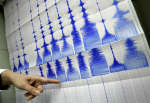|
|
|
Asian Internet Services Disrupted by Taiwan Quakes
World Business News |
2006/12/26 22:45
|
Telecommunications around Asia were severely disrupted on Wednesday after earthquakes off Taiwan damaged undersea cables, slowing internet services and hindering financial transactions, particularly in the currency market. Banks and businesses across the region reported problems with communications, with some telephone lines cut and Internet access slowing to a crawl.
South Korea's top fixed-line and broadband service provider, KT Corp, said in a statement that six submarine cables were knocked out by Tuesday night's earthquakes.
"Twenty-seven of our customers were hit, including banks and churches," a KT spokesman said. "It is not known yet when we can fully restore the services."
Banks in Seoul said foreign exchange trading had been affected.
"Trading of the Korean won has mostly halted due to the communication problem," said a dealer at one domestic bank.
Some disruption was also reported in the important Tokyo currency market but the EBS system that handles much dollar/yen trading appeared to be working.
Global information company Reuters Group Plc said all users of its services in Japan and South Korea had been affected.
One Tokyo foreign exchange trader said: "There are many currencies in which market-making is being conducted via Reuters and such currencies such as the Australian dollar and the British pound are in a very tenuous situation now."
State secret
In China, trading in currencies and copper appeared to be normal and both the Shanghai stock market and money market were working.
But China Telecommunications Group, the country's biggest fixed-line telephone operator and parent of China Telecom Corp., said the earthquakes had affected lines "from the Chinese mainland to places including the Taiwan area, the United States and Europe, and many have been cut".
"Internet connections have been seriously affected, and phone links and dedicated business lines have also been affected to some degree," it said.
Officials declined to give further details. "Undersea communications cables fall in the area of state secrets," said a ministry of communications official in Beijing.
The main quake, measured by Taiwan's Central Weather Bureau at magnitude 6.7 and at magnitude 7.1 by the US Geological Survey, struck off Taiwan's southern coast at 1226 GMT on Tuesday. Two people were killed.
Taiwan's Chunghwa Telecom said two of four major undersea cables out of Taiwan had been affected. Voice circuits had been reduced to 40% of capacity to the United States and just 2% to most parts of Southeast Asia.
KDDI Corp., Japan's second-largest telecoms company, said communications along submarine cables out of Japan went through Taiwan before reaching Southeast Asian countries, which was leading to disruption.
But it said communications were unlikely to break down completely since there were alternative lines.
PCCW, Hong Kong's main fixed-line telecoms provider, said several undersea cables it part-owned had been damaged. "Data transfer is down by half," a spokeswoman said.
Both Singapore Telecommunications (SingTel), Southeast Asia's top phone company, and local rival StarHub Ltd., said customers were suffering slow access to Internet pages.
But SingTel said traffic was being diverted and repair work was in progress, adding: "Our submarine cables linking to Europe and the US are not affected." |
|
|
|
|
|
|
Class action or a representative action is a form of lawsuit in which a large group of people collectively bring a claim to court and/or in which a class of defendants is being sued. This form of collective lawsuit originated in the United States and is still predominantly a U.S. phenomenon, at least the U.S. variant of it. In the United States federal courts, class actions are governed by Federal Rules of Civil Procedure Rule. Since 1938, many states have adopted rules similar to the FRCP. However, some states like California have civil procedure systems which deviate significantly from the federal rules; the California Codes provide for four separate types of class actions. As a result, there are two separate treatises devoted solely to the complex topic of California class actions. Some states, such as Virginia, do not provide for any class actions, while others, such as New York, limit the types of claims that may be brought as class actions. They can construct your law firm a brand new website and help you redesign your existing law firm site to secure your place in the internet. |
Law Firm Directory
|
|





